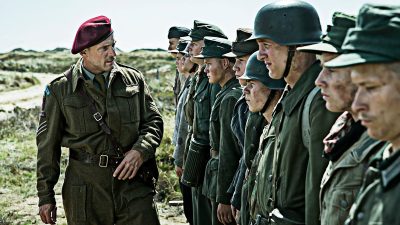
In a film landscape awash with stale period pieces and war dramas, “Land of Mine” is a unique foreign picture that injects some life into the genre by bending the perceptions of war narratives while simultaneously being an emotional powerhouse.
The Danish film, directed by Martin Zandvliet, takes place immediately after the end of World War II and follows a small group of young, German prisoners of war who are not allowed to go home until they have cleared the Danish coastline of German landmines.
The film, which was nominated for Best Foreign Language Film at the 2017 Academy Awards, is unique in that it flips the traditional narrative of World War II films by not casting the Germans as the villains, but rather as the protagonists of the story.
Still, it is not meant to illicit sympathy for the Germans, but rather to wipe away the historical barriers that divide nations and focus more on humanizing the soldiers on an individual level.
The film deliberately casts the prisoners as teenage soldiers who were conscripted into the war against their will and do not harbor the hate and resentment that their country’s regime was known for.
The film mostly explores the moral dilemma faced by Sgt. Carl Rasmussen (Roland Møller), who is in charge of the POW unit. Yet slowly, he begins to form an emotional connection with the prisoners due to their young age, despite having a large prejudice against the German people.
His inner conflict represents the largest theme of the film — the message of unity, and how prejudice among nations must be stripped down in order to foster genuine connections between people of different nationalities.
Møller brilliantly conveys this emotional depth, and transitions from a hateful, brutal sergeant to a sympathetic man who eventually comes to see the humanity in others. It is perhaps one of the best acting performances of the year, a role worthy of recognition worldwide, not just in his home country of Denmark.
His performance is powerful enough to make the audience question their own convictions and prejudice: do we hate the German prisoners regardless of who they are for what their country did during the war? Or do we feel sympathy for this group of boys who are just trying to get back to their country?
Møller is supported by a very young, but strong cast that plays the group of POWs. Louis Hofmann, who plays Sebastian Schumann, the most vocal and prominent of the prisoners, shines in his supporting role.
Another one of the film’s strong suits is Zandvliet’s ability to create suspense that permeates throughout the movie.
While any film that revolves around the defusing of mines is by nature suspenseful, the director is able to create suspense in unique ways by building it with dialogue, sound or minute visual details rather than with tense music or dramatic cuts.
Even scenes where the prisoners are casually defusing mines and chatting away about their postwar ambitions become hyperintense, because the audience knows an explosion can come at any time.
This type of nonstop intensity refuses to let the audience feel safe at any point in the film, so they are glued to the edge of their seat, even in scenes away from the minefield.
This directorial expertise is coupled with fantastic cinematography, which contrasts picturesque, sparkling Danish beaches with the black and charred destruction of the landmines.
Still, what is most powerful about the film is the message of unity and the emotion between the characters, two things not often found in a war film.
“Land of Mine” separates itself from the long list of bleached period pieces by telling a war story from a different perspective and providing a strong, emotional message about humanity.
“Land of Mine” opens nationwide on Friday.
























































































































